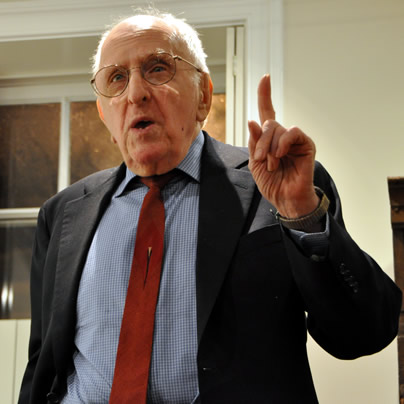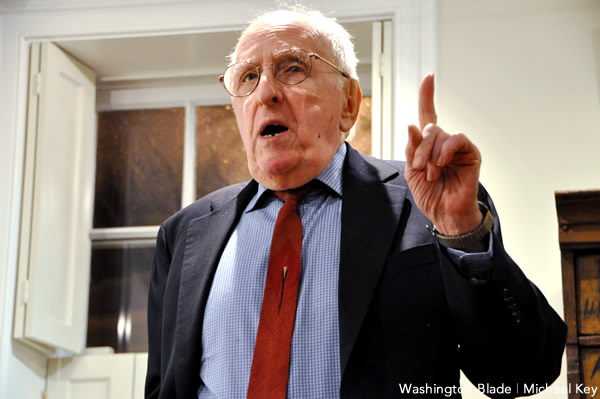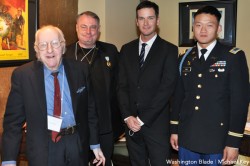Local
An end to Kameny burial stalemate?
‘Tentative agreement’ could clear way for interment of activist’s ashes


Frank Kameny died in October 2011 but his ashes remain in limbo due to a dispute between his estate and a local non-profit. (Washington Blade photo by Michael Key)
An attorney representing the estate of nationally acclaimed gay rights pioneer Frank Kameny said on Wednesday that a “tentative agreement” has been reached to end a dispute that has prevented Kameny’s ashes from being interred at D.C.’s Congressional Cemetery nearly two years after his death.
Christopher Brown, an attorney with the gay-owned law firm Ackerman Brown, said the tentative agreement was reached on July 9 with Helping Our Brothers and Sisters (HOBS), a local LGBT charitable group that bought a plot for the burial of Kameny’s ashes at Congressional Cemetery after soliciting donations from the community to pay for it following Kameny’s death on Oct. 11, 2011.
Brown’s comment came one day after Ackerman Brown’s client, Timothy Clark, Kameny’s longtime friend and heir to his estate, told the Blade that he understood that an agreement between the two parties over the cemetery plot had been reached.
“We reached an agreement on that so I’m going to keep the burial plot,” Clark said in a telephone interview.
“I just have to decide on when I want to have something,” he said in referring to a burial ceremony at the cemetery. “I just don’t know. But I’m open to any suggestions that anybody wants to have because that was Frank’s life. The gay community was Frank’s life. That’s what he fought for.”
HOBS and a group of Kameny’s friends and colleagues in the LGBT rights movement initially scheduled an interment ceremony for Kameny at the cemetery for March 3, 2012. But they abruptly cancelled it after the estate reportedly told the cemetery it would not release Kameny’s ashes until it obtained legal ownership of the burial plot from HOBS.
For more than a year, HOBS and Ackerman Brown have declined to publicly disclose specific details of the nature of the dispute between the two parties over the burial plot other than to say they were negotiating an agreement to enable HOBS to transfer ownership of the plot to the estate.
“[W]e would point out that HOBS has never stood in the way of or delayed the burial of Dr. Kameny’s ashes,” said HOBS President Marvin Carter in an email to the Blade earlier this month. “HOBS has made numerous proposals and overtures to the Kameny estate to have Dr. Kameny’s remains buried at Congressional Cemetery.”
Brown told the Blade in an email on Wednesday that the estate, which is in possession of Kameny’s ashes, also is interested in moving ahead with the burial.
“The estate has always been, and remains willing to work with gay community representatives who knew Frank Kameny in organizing a burial service and appropriate gravesite at which members of the community could pay tribute to Kameny,” Brown said in his email.
In response to a request from the Blade last month, HOBS on Wednesday released information about the money it raised and spent both for Kameny’s personal needs in the last years of his life and for expenses related to Kameny’s funeral and planned burial.
HOBS’s IRS 990 finance reports filed with the IRS for 2010 and 2011 – the most recent such reports publicly available for HOBS – don’t include specific information about money raised for Kameny-related projects.
But the reports show that HOBS’s income increased dramatically in 2010 and 2011 during a period when the non-profit, tax-exempt group and its supporters appealed to the LGBT community for Kameny-related donations — initially to help Kameny pay household expenses and property taxes and later for Kameny’s funeral and burial.
The 990 reports, which all tax-exempt organizations are required to file, show that HOBS’s income was $2,125 in 2008, the first year for which such figures are reported, and $6,544 in 2009. The reports show that in 2010, HOBS’s income rose to $61,480 and in 2011 its income increased to $115,440.
In an op-ed column published in the Blade just before the Thanksgiving holiday in November 2011, Carter discussed efforts by HOBS and other groups and individuals to arrange two separate memorial services for Kameny, one of which was held at the Carnegie Library building in downtown D.C.
“Thus far, with the generosity of many friends, we have covered expenses for Kameny’s viewing at Carnegie Library and his essential funeral costs, too,” which Carter later explained involved paying for Kameny’s cremation and the rental of a casket and the service of a funeral hearse for the viewing ceremony.
“In addition, we have now paid the deposit on a fitting, public gravesite for Kameny at the historic Congressional Cemetery,” he said in the op-ed. “For all who wish to help raise the remaining $4,000 anticipated; you may make your tax-deductible contribution online…or simply mail a check to HOBS…”
The Blade and other local publications also published stories on HOBS’s Kameny-related fundraising activities for the funeral and burial and efforts by HOBS to help Kameny prior to his death.
One effort organized by local gay activist Ben Carver in 2010 was billed as the “Buy Frank a Drink” campaign, which Carver promoted on a Facebook page.
HOBS’s 990 report for 2012, which would include that year’s income, has yet to be released by the charitable watchdog group Guidestar.com, which obtains 990 reports for nearly all U.S. non-profit groups each year from the IRS. HOBS’s 990 report for 2010 was filed in November 2011, and its 2011 report was filed in November 2012. This suggests that its 2012 990 report will likely be filed in November of this year.
The 2011 report shows that HOBS during that year spent $66,413 on “direct support to qualified individuals,” $20,222 on “mentoring programs,” and $11,605 on “educational programs.”
Those three programs, which came to a total of $98,240, accounted for the bulk of HOBS’s expenditures for that year. The 2011 report shows that all other expenses were under $4,000 and were for administrative and overhead expenses such as supplies ($3,727), board meetings ($1,007), Internet ($1,555), meals and entertainment ($505), and telephone ($1,494). More detail on those reported expenses wasn’t available.
Carter discussed HOBS’s mission in an email he sent the Blade on July 24, which also provided information about money HOBS raised and spent on Kameny-related projects.

The late Frank Kameny (left) standing next to Marvin Carter at a HOBS benefit dinner in 2010. (Washington Blade file photo by Michael Key)
HOBS “is an all-volunteer micro-charity that helps marginalized LGBT individuals in our community to meet short-term and often life-sustaining needs,” Carter said. “We focus on helping those who often do not fit the criteria for help from other organizations or agencies – filling gaps in human distress here in Washington, D.C. A sizable portion of our work involves discrimination cases too, many involving torture and asylum,” said Carter, referring to cases noted on the group’s website in which HOBS assists LGBT foreign nationals seeking U.S. political asylum to escape persecution in their home country.
“Before his passing, HOBS assisted Dr. Kameny frequently with some of his essential needs, including transportation for doctor’s appointments, the use of a mobile phone, groceries and meals, urgent bathroom plumbing repairs, repair of his eyewear, and the payment of past property tax bills to prevent his home foreclosure – spending in total thousands of dollars in the years before his death,” Carter said.
Carter provided these figures and related information in connection with the contributions HOBS received and expenditures it incurred for Kameny-related projects in 2010 and 2011:
- Contributions earmarked by donors for Kameny’s burial expenses totaled about $800.
- Other donors “make clear that their donations may be used for HOBS’ general mission,” were silent about how to use the donations.
- During this period, “approximately $15,000 was raised in connection with our general fundraising efforts.”
- HOBS incurred expenses totaling approximately $8,500 related to the purchase of a cemetery plot for Kameny at Congressional Cemetery, cremation expenses and “other expenses of the funeral home (including rental of a casket and hearse for transporting Dr. Kameny’s ashes to the memorial service…and a gravesite marker reading ‘Gay is Good.’”
- There was no surplus of funds from contributions for Kameny’s burial and memorial service efforts. HOBS used money from its general operating account to cover the Kameny funeral and burial expenses not covered by earmarked donations.
- HOBS did not solicit funds for payment of Kameny’s property taxes in 2011. It did raise money for and contributed to Kameny’s property tax payments in 2010.
District of Columbia
D.C. Black Pride theme, performers announced at ‘Speakeasy’
Durand Bernarr to headline 2026 programming

The Center for Black Equity held its 2026 DC Black Pride Theme Reveal event at Union Stage on Monday. The evening, a “Speakeasy Happy Hour,” was hosted by Anthony Oakes and featured performances by Lolita Leopard and Keith Angelo. The Center for Black Equity organizes DC Black Pride.
Kenya Hutton, Center for Black Equity president and CEO, spoke following the performances by Leopard and Angelo. Hutton announced this year’s theme for DC Black Pride: “New Black Renaissance.”
Performers for 2026 DC Black Pride were announced to be Bang Garcon, Be Steadwell, Jay Columbus, Bennu Byrd, Rue Pratt and Akeem Woods.
Singer-songwriter Durand Bernarr was announced as the headliner for the 2026 festivities. Bernerr gave brief remarks through a video played on the screen at the stage.
DC Black Pride is scheduled for May 22-25. For more information on DC Black Pride, visit dcblackpride.org.
Virginia
Arlington LGBTQ bar Freddie’s celebrates 25th anniversary
Owner asks public to support D.C.-area gay bars

An overflowing crowd turned out Sunday night, March 1, for the 25th anniversary celebration of Freddie’s Beach Bar, the LGBTQ bar and restaurant located in the Crystal City section of Arlington, Va.
The celebration began as longtime patrons sitting at tables and at the bar ordered drinks, snacks, and full meals as several of Freddie’s well-known drag queens performed on a decorated stage.
Roland Watkins, an official with Equality NoVa, an LGBTQ advocacy organization based in the Northern Virginia areas of Arlington, Alexandria, and Fairfax County, next told the gathering about the history of Freddie’s Beach Bar and the role he said that owner Freddie Lutz has played in broadening the bar’s role into a community gathering place.
“Twenty-five years ago, opening a gay bar in Arlington was not a given,” Watkins told the crowd from the stage. “It took courage, convincing, and a deep belief that our community belongs openly, visibly, and proudly,” he said. “And that belief came from Freddie.”
Watkins and others familiar with Freddie’s noted that under Lutz’s leadership and support from his staff, Freddie’s provided support and a gathering place for LGBTQ organizations and a place where Virginia elected officials, and candidates running for public office, came to express their support for the LGBTQ community.
“Over the past 25 years, Freddie’s has become more than a bar,” Watkins said. “It has become a community maker.”
Lutz, who spoke next, said he was moved by the outpouring of support from long-time customers. “Thank you all so much for coming tonight and thank you all so much for your support over the past 25 years,” he said. “I can’t tell you how much that means to me and how much it’s kept me going.”
But Lutz then said Freddie’s, like many other D.C. area gay bars, continues to face economic hard times that he said began during the COVID pandemic. He noted that fewer customers are coming to Freddie’s in recent years, with a significant drop in patronage for his once lucrative weekend buffet brunches.
“So, I don’t want to be the daddy downer on my 25-year anniversary,” he said. “But this was actually the worst year we’ve ever had,” he added. “And I guess what I’m asking is please help us out. Not just me, but all the gay bars in the area.” He added, “I’m reaching out and I’m appealing to you not to forget the gay bars.”
Lutz received loud, prolonged applause, with many customers hugging him as he walked off the stage.

In an official statement released at the reveal event Capital Pride Alliance described its just announced 2026 Pride theme of “Exist, Resist, Have the Audacity” as a “bold declaration affirming the presence, resilience, and courage of LGBTQ+ people around the world.”
The statement adds, “Grounded in the undeniable truth that our existence is not up for debate, this year’s theme calls on the community to live loudly and proudly, stand firm against injustice and erasure, and embody the collective strength that has always defined the LGBTQ+ community.”
In a reference to the impact of the hostile political climate, the statement says, “In a time when LGBTQ+ rights and history continue to face challenges, especially in our Nation’s Capital, where policy and public discourse shape the future of our country, together, we must ensure that our voices are visible, heard, and unapologetically centered.”
The statement also quotes Capital Pride Alliance CEO and President Ryan Bos’s message at the Reveal event: “This year’s theme is both a declaration and a demand,” Bos said. “Exist, Resist, Have Audacity! reflects the resilience of our community and our responsibility to protect the progress we’ve made. As we look toward our nation’s 250th anniversary, we affirm that LGBTQ+ people have always been and always will be part of the United States’s history, and we will continue shaping its future with strength and resolve,” he concluded.
-

 India4 days ago
India4 days agoActivists push for better counting of transgender Indians in 2026 Census
-

 Advice4 days ago
Advice4 days agoDry January has isolated me from my friends
-

 District of Columbia4 days ago
District of Columbia4 days agoCapital Pride reveals 2026 theme
-

 National4 days ago
National4 days agoAfter layoffs at Advocate, parent company acquires ‘Them’ from Conde Nast



















